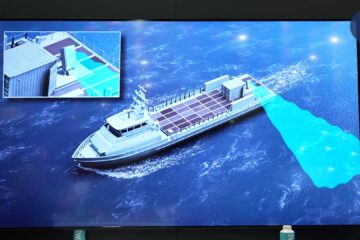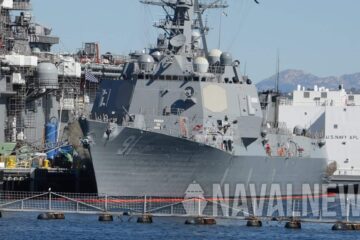TF 59 has now reached Full Operational Capability (FOC). TF 59 aims to have 100 unmanned vehicles by the summer of this year, with control of the drones split out between the U.S. and its partners in the region.
TF 59 was stood up just in September 2021. With headquarters in Bahrain, it is the U.S. Navy’s first employment of unmanned aerial systems (UAS), unmanned sea vessels (USV), and unmanned underwater vehicles (UUV) in numbers that combine their capabilities with manned platforms for multidomain operations.
VADM Cooper also discusses the integration of non-US systems to TF 59 (such as the Seagull USV by Elbit Systems and the DriX by Exail), the cooperation with the Royal Navy and French Navy, and the forward basing of Littoral Combat Ships (LCS) in Bahrain.
VADM Cooper currently serves as commander of United States Naval Forces Central Command, Commander, United States Fifth Fleet and Commander, Combined Maritime Forces.

Xavier Vavasseur, Naval News: I wanted to discuss with you a little bit about Task Force 59, the unmanned Task Force in Bahrain, in your headquarters. What are some of the latest milestones you achieved?
VADM Cooper: Just a quick refresher on what Task Force 59 is about. Eighteen months ago, we saw the need to to enhance maritime domain awareness. And we saw emerging technology with unmanned systems artificial integration. So we went from a two page paper about 18 months ago established Task Force 59, begin to put ourselves on a trajectory to bring these platforms, integrate them with artificial intelligence, and have out of both Bahrain and Aqaba Jordan, with our partners, and and move forward and taking this new and emerging technology to applying it in the maritime both to enhance maritime security, as well as enhance our deterrence overall.
So where are we today, just in the last couple of weeks and months, we’ve had the latest iteration of bringing the world’s most promising technologies here to the Middle East and operating them in an exercise called Digital horizon. We’ve achieved what the military calls FOC, our full operating capability. So Task Force 59, is up and running at full. As I mentioned earlier, today, we’re up and running full with our partners in the region, as well as many NATO allies. So that’s quite encouraging. And in total, we have about 30,000 operating hours, which is an enormous volume of time I mentioned in my remarks earlier, you know, that is if you went Monday to Friday, nine to five, that would take about 13 years to accumulate that level of experience. So we find ourselves and from experience, perspective, a lot of experience and know how to use these platforms in meaningful way. During our exercise called Digital horizon, we had one operator controlling, for instance, 12 USVs, at one time, that would have been unimaginable even a year ago. So you get a sense of how fast the technology coupled with AI can really move us forward. And then as I mentioned today, most recently operating with our Emirati partners for the first time, that’s very exciting. And then looking to the future, bringing in more partners into the equation, more USVs along the ultimate goal, which is to put 100 USVs operating in these waters by the end of the summer. As I mentioned, we’re about we’re about halfway there.
Xavier Vavasseur: Those already impressive numbers! Your guys at TF 59 5th Fleet are really kind of like pioneers and becoming real experts in unmanned systems in the maritime domain…
VADM Cooper: You know, as I mentioned, the real secret sauce here is the people. It’s the Task Force 59 leadership, it’s our partner nations that are coming in. That’s what’s allowed us to move so quickly. It’s encouraging.
Xavier Vavasseur: And you recently, you opened up to non US contractors. Why did you take that move? And what does it bring to Fifth Fleet?
VADM Cooper: A part of exercise Digital Horizon, we actually went out to a very broad group in private sector, and said, bring your most advanced and proven unmanned systems and artificial intelligence platforms from around the world. And through a process with a Defense Innovation Unit. We got 105 submissions from companies that got whittled down to about 15. Those 15 companies came out 10 of which were out here for the first time, one of which was from Israel, one of which was from France, and did a fantastic job. And, you know, we’re looking for the best we’re looking for the best in breed and to maintain the best in technology. And as long as it’s from our from our friends, we’re happy to work with them.
Xavier Vavasseur: Speaking of friends, are you doing a lot with the Royal Navy and the French Navy in the region?
VADM Cooper: We are highly integrated with both the Royal Navy and the French Navy. My deputy for CMF is over there off my port bow. We’re working with the UK in ways big and small every single day very closely. And of course, we’re also co located on the on the base with in Bahrain with a large UK contingent, that very helpful, but really, it’s the people that are working very closely together. And as I mentioned, we just bought a UK Captain into task force with the nine as the deputy. It gives you just a sense of how integrated we are. In terms of the French we just finished up two months of operating with Charles de Gaulle Carrier Strike Group, we’ve had multiple guided missile destroyers working with them throughout the region, doing very high end exercises and operations. I couldn’t be more proud. My good friend Admiral Slaars is here today. And, and we have a very frequent drumbeat going on and couldn’t be happier with that relationship.
Xavier Vavasseur: Last question, if I may, regarding Littoral Combat Ships, you mentioned at a conference last month, something about forward basing them in Bahrain, can you tell us about the plan?
VADM Cooper: Yeah, in the near term, we do expect a future LCS deployments to the region. We’re looking forward to that. Those platforms bring superb capability that I think is highly applicable here in the region. And there’s already been Navy decisions to bring them out in greater numbers in the future.
Xavier Vavasseur: And I’ve been in Mayport recently entered the USS Cooperstown and what stood out is that there are great unmanned mothership platforms.
VADM Cooper: Yeah, obviously I’m not going to talk about future capabilities. But there as you probably saw on your visit to the Cooperstown, great name, by the way, is that there’s lots of capacity for UUVs, USVs and UAVs. And so we’ll look to incorporate those technologies when the when the LCS come out here.





